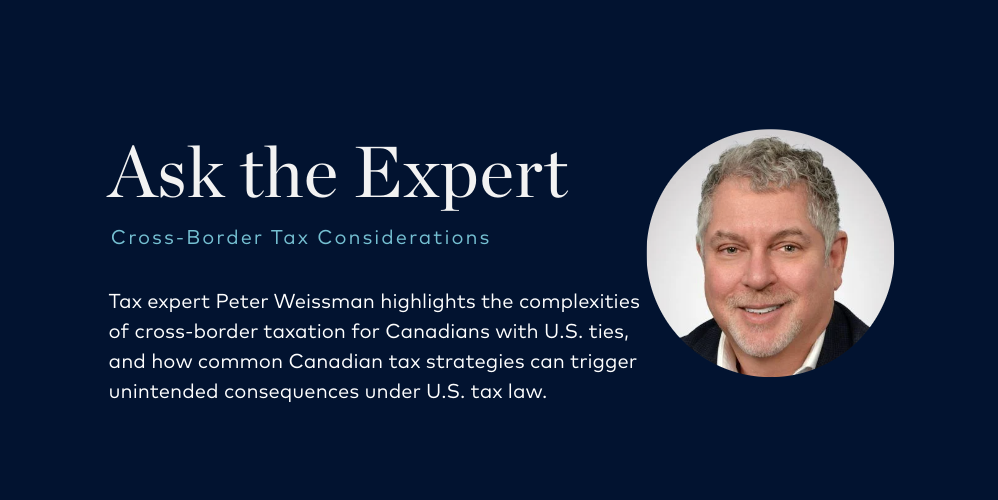A conversation with Peter Weissman, Partner at Cadesky Tax
Canada and U.S. may be neighbours, but when it comes to how they tax individuals and businesses, they are worlds apart.
We sat down with Peter Weissman, a partner at boutique tax planning firm Cadesky Tax, to unpack the real-life implications of cross-border tax issues. His message was clear: for Canadians with U.S. connections or businesses, or U.S. citizens doing business north of the border, assuming the two systems “work the same” can be a costly mistake.
A Different Set of Rules
The first distinction is foundational. Canada taxes people on their worldwide income only if they are resident in Canada; citizenship is not a factor. U.S. citizens are taxed on their worldwide income even if they are not residents of the U.S.
“If you’re a Canadian resident, you’re taxed on your worldwide income,” Peter explains. “But if you’re a U.S. citizen living in Canada, you’re effectively playing by two sets of tax rules; Canadian and American.” That overlap can result in significant complexity, and in some cases, double tax exposure. The Canada – U.S. tax treaty helps resolve some of the problems, but not all.
Why Planning Tools Don’t Always Translate
Sophisticated planning tools like family trusts, capital dividends, and estate freezes are widely used in Canada for tax and succession planning strategies. But once U.S. tax laws enter the equation, many of these tools either lose their effectiveness, or worse, backfire.
Take capital dividends, for example. In Canada, these tax-free dividends play a major role in estate planning, insurance strategies and sales of businesses. But, not so fast, if you are a U.S. citizen resident in Canada. “For U.S. citizens, capital dividends become fully taxable,” Peter says. “It’s a good example of how something that works well in Canada has unintended and expensive consequences across the border.”
Family trusts are another area where U.S. status introduces complexity. “If a U.S. person is a trustee or beneficiary, it opens up a completely different layer of compliance and tax exposure,” Peter explains. “You can’t assume a standard Canadian trust structure will work. It usually won’t.”
Leaving Canada? It’s Not as Simple as Packing Up
Many successful Canadians eventually consider a move to the U.S., whether for business expansion, lifestyle, or retirement. But Peter warns: “Leaving Canada from a tax standpoint isn’t as simple as packing your bags.”
Upon departure, Canada deems you to have disposed of your assets at their current fair market value. “That includes your investment account, shares in private companies, but not Canadian real estate ” Peter notes. “There are options to defer the tax in some cases, but you’ll still owe tax, albeit deferred, based on the value at the time you left.” If the asset value declines after the move, you’re still taxed on the earlier, higher value. “It’s one of those moments where a cross-border lens can really change the advice,” Peter says. It’s also a reason to discuss departure early in the planning process as some structures can be effective at avoiding the deemed disposition rules.
The Estate Planning Disconnect
Estate planning is another area where the systems diverge sharply. Canada doesn’t have an estate tax, but the U.S. does, and it’s based on worldwide assets for U.S. citizens, or U.S. situs assets for Canadians who are not U.S. citizens. U.S. stock in Canadian investment accounts are U.S. situs assets, as is U.S. real estate.
Currently, the U.S. estate tax exemption is just under $14 million USD per individual. But for estates exceeding that threshold, tax can reach up to 40% of asset value, not just on accrued gains. “That’s a significant hit for those who aren’t properly structured,” Peter says.
In Canada, we often use an estate freeze to lock in the value of a founder’s shares and pass future growth to the next generation. But in the U.S., this strategy can trigger a deemed sale. “It’s not recognized the same way,” Peter explains. “And if done incorrectly, you might be creating a tax bill you weren’t expecting.” We often use family trusts in estate planning but that can be a problem for U.S. beneficiaries.
When Selling a Business, Citizenship Matters
We wrapped up our conversation by talking through a real-life example: an American citizen living in Canada, who owns shares in a Canadian company and is preparing for a sale.
“On paper, they were given excellent tax advice on things like extracting capital dividends and shifting ‘safe income’ between companies,” Peter says. “But it is clear the advisor did not consider their U.S. citizenship. The result? The strategy triggered significant U.S. tax.”
It’s a cautionary tale Peter sees too often: “Had U.S. citizenship been considered from the beginning; they would have been advised quite differently.”
Plan Early, Ask the Right Questions
Whether you’re a U.S. citizen living in Canada, a Canadian moving south, or planning a cross-border business transaction, one step is essential: get specialized advice early. “Disclose your citizenship status early,” Peter advises. “And make sure your advisory team includes someone with meaningful cross-border expertise. The systems don’t align naturally, and it takes experience to bridge the gap.”
The cost of not doing so can be significant; not just in taxes owed, but in missed opportunities for better planning.


